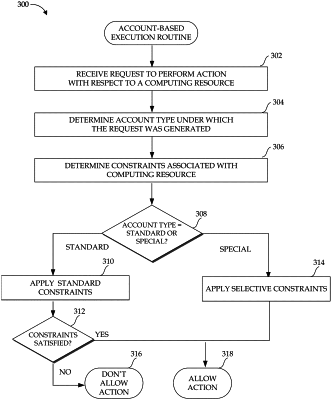| CPC H04L 41/5003 (2013.01) [H04L 67/51 (2022.05)] | 20 Claims |

|
1. A system comprising:
an account manager comprising a first set of one or more computing devices and configured to maintain account data for individual accounts of a plurality of accounts, wherein account data for a particular account represents an account type to which the particular account is assigned, wherein the account type is one of a plurality of account types, and wherein the plurality of account types comprises:
a production account type subject to data object constraints for mitigation of negative impacts to production workloads from inadvertent actions taken on resources associated with the particular account; and
a test account type for which at least one of the data object constraints are to be bypassed for efficient testing of resources associated with the particular account; and
a network-based service comprising a second set of one or more computing devices and configured to:
receive, from a first computing device, a first request initiated using a first account to execute a first action on the network-based service, wherein execution of the first action under the standard account type is subject to satisfaction of one or more constraints of the data object constraints;
retrieve, from the account manager, first account data indicating the first account is assigned to the special account type;
execute the first action to completion without requiring satisfaction of at least one of the one or more constraints based on the first account being assigned to the special account type;
receive, from a second computing device, a second request initiated using a second account to execute a second action on the network-based service, wherein execution of the second action under the standard account type is subject to satisfaction of the one or more constraints;
retrieve, from the account manager, second account data indicating the second account is assigned to the standard account type;
determine that the second action fails to satisfy the one or more constraints; and
prevent the second action from being fully executed based on the second action failing to satisfy the one or more constraints.
|